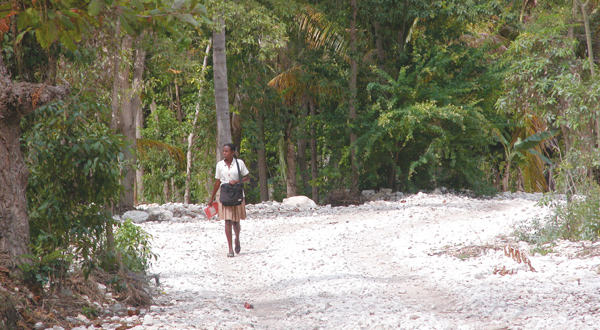In pursuit of the whole road

There is a village in the Ivory Coast of Africa that has a custom I’d never heard of until we were walking toward it. I was there with a group of students from Point Loma Nazarene University, where I teach, and we wanted to get from one side of an island to another. But to get to that other side, we needed permission, according to our guide.
The custom works like this: If you pass through one village on the way to another, which is what we needed to do, we had to ask the leaders of the first village for their approval. That would be like, if I wanted to go from my home town in San Diego to Los Angeles, I would need to get permission from the leaders of Oceanside to do it. It’s a bit of a formality, our guide told us, but one we should not ignore.
“What if they say no?” I asked.
“The village leaders will say one of two things,” the guide told us. “They will grant you either the whole road or just half the road.”
That means they will let us pass through their village, he said. If they think we are honorable and safe, they will grant us “the whole road,” which means they give us permission to return through that same village. If they don’t trust us, don’t like us, or for some reason they just don’t want to see us again, they will grant us “half the road.” That means we can pass through their village, but we must find a different way back. That would be like Oceanside telling me that yes, I can pass through once, but Interstate 5 was closed for the return trip. Maybe take Interstate 15 instead, which would be a real hassle. Very time consuming and inconvenient.
“Is there another way back?” I asked.
“We’d have to go through the forest in the dark,” the guide said. “That’s not the option we want.”
No kidding. Flashlights vs. forest. I think the forest wins.
So when we got to the first village, everyone was on their best behavior. We met with the village leaders, told them who we were and what our intentions were—we were going to participate in a worship service on the other side of the island. They brought out chairs, built a bench so we could all fit, set us in a circle with them, sent one of the kids for bottles of soda for everyone, asked where we were from, how many brothers and sisters we had. We didn’t speak each others’ languages, so all of this needed translation.
This custom is called asking for “the news.” Then we asked the same about them. It was formal, but friendly, punctuated with lots of laughter. Then we shook hands and continued on our journey.
They gave us the whole road. Whew.
The idea of this “whole road/half the road” concept has stayed with me.
Because of course we often approach God the way our group approached the first village. Be on your best behavior, don’t say anything silly, act like you really care, make your request in just the right way with proper respect and humility, then, MAYBE we’ll get what we want, whether it’s forgiveness, healing or a new pony. Remember, you have to impress God if you want him to do anything for you.
The story of the Prodigal explodes that idea.
Henri Nouwen says that the parable we call The Prodigal Son could just as easily be called the parable of the Forgiving Father. In the story, the son disrespects and insults the father, and leaves on his own road. His ego has convinced him that he has a better idea for how he could be living.
When he comes to his senses he has to think, “Do I have half the road or the whole road?” Is the way away from the father a one-way street? Something in the son made him think that maybe, just maybe, his father had granted him the whole road. Either way, he felt like he needed to find out.
And while the son was still a long ways off, Scripture says, the father saw him and ran to him. The father met the son while the son was still on the road.
There is always a way back. That whole road is there.
Guess who built that road in the first place?
— by Dean Nelson
Nelson is the founder and director of the journalism program at Point Loma Nazarene University in San Diego. His most recent book is “God Hides in Plain Sight: How to See the Sacred in a Chaotic World.”





